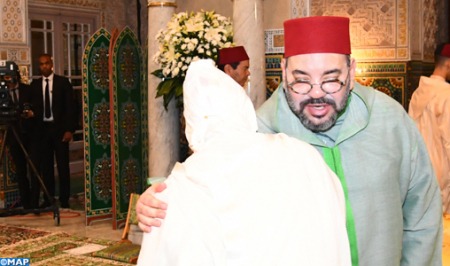HM the King, Commander of the Faithful, Chairs Fifth Ramadan Lecture in Casablanca

The lecture was delivered by professor Mohamed Laaroussi, head of the cardiology department at Rabat Ibn Sina hospital, under the theme “The secrets of heart between religious signs and scientific changes”, drawing on Quranic verse “So have they not traveled through the earth and have hearts by which to reason and ears by which to hear? For indeed, it is not eyes that are blinded, but blinded are the hearts which are within the breasts”. (Surat Al Haj).
The lecturer focused in his presentation on four main aspects related to “the definition of the heart through scientific discoveries”, the “heart in the Holy Quran and Sunnah… between truth and interpretation”, “scientific developments in cardiology” and the “miracles of the Holy Quran in cardiology”.
Professor Laaroussi started his lecture by stating that there is no question for him of submitting religion to the reality of science, the results of which are constantly evolving, nor of limiting the understanding of religion to provisional scientific conclusions, therefore, he noted that religion has come to guide people in the right direction and has used, for this purpose, the appropriate language.
Recalling that medical science has discovered wonders in recent years related to the functioning of the heart, the lecturer noted that scientific studies and research have not in the past given any importance to thought, perception, feelings or emotion, treating the heart as a simple physiological organ or complex muscle that pumps blood and circulates it through all tissues of the human body.
However, the development of science and the qualitative leap in cardiac surgery around the world, and heart transplantation in particular, has caused this truth to begin to waver between constancy and evolution, he stressed.
The heart, as a source of faith and a centre of spirituality, is far from being a simple complex machine that works according to a special mechanism of pumping blood into the body, he noted, recalling that scientists had come up with new and thought-provoking discoveries at the beginning of the 21st century. These include, Laaroussi went on to say, the radical psychological changes and upheavals that have occurred as a result of certain heart transplant procedures, and that have affected the spirituality and beliefs of patients.
This new situation, he said, had the effect of reintroducing some questions about the scientific and medical definition of the heart as agreed: Is the heart a simple machine governed by quantum mechanisms or is it a larger field, which is cited 132 times in the Holy Quran? Are the heartbeats just periodic modulations of a signal or do they represent a path that nourishes the brain and guides it to understanding and perception?
Regarding the first aspect, the lecturer said that the heart, the muscle located on the left side of the rib cage, weighing about 300 grams, is a wonder of creation that exceeds the capacities of any human brain.
The heart pumps five litres per minute, i.e. 7,500 litres in one day, between reflections and contractions, through a 100,000 kilometre network of arteries and veins, he added, noting that the heart carries oxygen and essential nutrients to every cell in the body, meaning that the heart is the main source of the body’s movement.
Scientists at the Heart Mathematics Institute in the United States of America have discovered that heartbeats have an impact on the waves emitted by the brain, concluding that the heart and brain are simultaneously active, he pointed out.
Referring to the second aspect, Professor Laaroussi said that the Holy Quran has a global vision of the heart and its synonyms, wondering: does the heart in the Quranic texts mean this muscle located in the rib cage or the brain itself?
The use of the heart in this sense has a metaphorical meaning, in that with medical progress and the assertion that the heart is limited to pumping blood into the body, some exegetes associated the heart, as quoted in the Quran and Sunnah, with the brain, he noted.
In the third part of his presentation, the lecturer pointed out that a major evolution has taken place in scientific research related to the heart, with salient features relating to the harmonious functioning of the heart and brain, the emergence of imbalances as soon as this relationship is disrupted.
After extensive research and clinical examinations, the scientists concluded that the link between the heart and the brain is binary dynamic, with the two organs impacting each other, he explained, adding that, according to them, the heart affects the brain at the neuropathic, biochemical, biophysical and electromagnetic levels.
Concerning the fourth aspect, Laaroussi said that scientific truths, which have required decades of research, cost billions of dollars and mobilized generations of scientists, were revealed in the Holy Quran 14 centuries ago, proving each time the miraculous nature of the Holy Book, he said.
He added that all cardiology studies have concluded that the heart has a meaning other than that established in the past, in that it represents more than a fibro-muscular organ that pumps blood, but nourishes the whole body with data at every beat.
At the end of the lecture, HM the King was greeted by several foreign religious figures.
